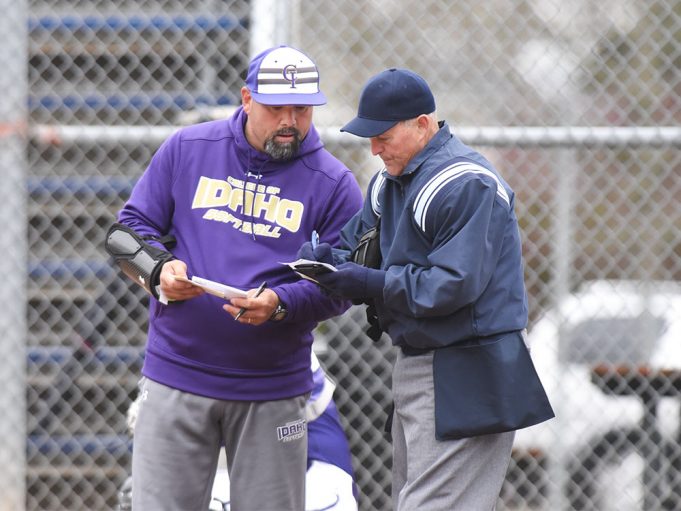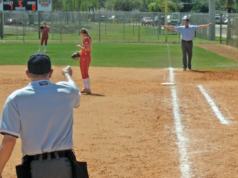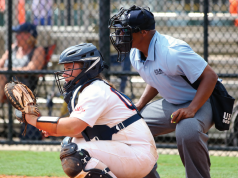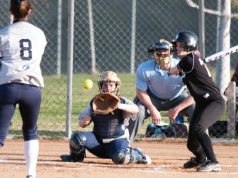If you are reading this and you are not a crew chief but have that as one of your goals, congratulations. You are taking a big step in your development as an umpire.
Being selected as a crew chief is an honor. Many crew chiefs have shown with their professional demeanor and actions on and off the field that they are leaders and can handle unique or tough situations with a clear head and proactive resolutions. They are expected to thoroughly know rules and mechanics, and must have excellent game management skills. Their main goal for a game or series is “success as a crew.”
When onfield situations develop that require a rule interpretation, the crew chief must step up and take the lead. The college and high school crew chief should have the ability to provide leadership and promote communication in both pregame and postgame discussions. They are expected to coordinate any travel plans with the crew, complete reports in a timely manner and possess integrity, honesty and outstanding character.
At times the crew chief may have to be part psychologist. The crew chief must understand the makeup of the crew and use the appropriate methods to get the best from his or her crew. If the crew is experienced and business-like with a good understanding of the importance of their job, a different style is required than if the crew is less experienced and perhaps a bit nervous. At one end of that style is a “stick to the basics” approach with a solid pregame and an effort to get the less-experienced crew to talk more. At the other extreme is a style for the more experienced crew, which is more philosophical.
Crew chiefs get involved with a lot more than the activities during game day. Their responsibilities may vary among conferences.
Preseason
When the schedules come out, the crew chief must study the schedule and begin strategizing the travel plans for the crew. In some conferences the crew chief will book the hotels and rental cars and coordinate the travel plans for the crew so everybody arrives at the airport at about the same time.
As the season approaches some conferences conduct meetings, which may include a separate session for crew chiefs. Those sessions will usually review requisite paperwork — crew chief reports, incident reports, halted game reports, proper contact with assigners and conference coordinators, etc. That paperwork serves as a main conduit of communications from the umpire crew to the coordinator and assigner.
Also discussed in the crew chief session will be:
- Pregame and postgame talks.
- Game conditions — rain, drizzle, mist.
- How to handle incidents; contacting the coordinator and filing the incident report.
- Points of emphasis for the conference for the upcoming year.
- Rule enforcement and areas of emphasis (e.g. illegal pitch, including the pitching lane, interference, obstruction and between-inning activities).
- Judgment — getting the call right, strike zone.
The crew chief’s preparation for the upcoming season also includes: studying the rules and mechanics; getting to the gym on a regular basis to be in top shape (that is important for setting a good example for the crew); working scrimmages or winter games, if possible. Many conferences have additional documentation for each sport, such as a handbook or umpire guidelines. It may include:
- Rescheduling policies. Although the coaches should be familiar with those policies, my experience shows that the crew chief is the first one they ask if a game is rained out.
- Playing rules (tiebreaker and other “options”), travel policy, pregame warmups, PA announcer.
- Forfeits — are they allowed or is the game rescheduled?
- Intermission between doubleheaders.
- Ground rules — are they provided in writing to the crew chief before the game?
- Umpire standards and conduct.
- Umpire evaluations.
- Travel and communication with host event administration.
- Pregame timeline.
- Rainout policy.
- Umpire guidelines — standards and responsibilities of crew chiefs.
Regular season
Prior to a series, crew chiefs must contact the crew to discuss travel plans about 60 days in advance. One month before the series they should contact the crew again to finalize the plans, and again one week before the series to ensure no changes. The crew chief is usually responsible for contacting event management one to two weeks before the series to:
- Provide the hotel phone number and the crew chief cell phone number.
- Confirm parking arrangements, game times, anticipated weather, umpire locker room location and any other pertinent information.
Pregame
The crew chief should contact the game management staff to confirm the crew’s arrival. Most of the time the staff will give the crew chief the game timeline and discuss any changes or additions to the regular pregame activities (senior day, special event day, television game details).
The crew chief should lead the crew to “walk the field” during which there should be a discussion about any ground rules. Many conferences will have the ground rules for each conference field listed in the umpire guidelines documentation.
The crew chief will start the umpire pregame discussion early enough to allow a thorough review of the important points and give the crew members time to add their comments and suggestions. The college softball CCA manual has a detailed section “Pregame — Self, Partner and Coaches.” The crew chief should be well-versed in the topics in that section and follow those guidelines. In addition, some conferences will issue weekly newsletters or updates to the crew chief with topics to be discussed. Those may be points of emphasis based on recent game situations, problems that may have happened recently which need to be corrected, changes in ground rules at a site, recent rule interpretations and game management issues.
Postgame
Conducting a postgame review immediately after the game is a vital part of the crew chief’s job. He or she must be familiar with the crew chief report and use that as a basis for discussion. Did the umpires work as a crew? Were there any breakdowns in mechanics? Did a rule interpretation arise? Did the crew have to come together for any discussions on the field? If so, were they handled properly? Were there any issues with the crew during the game? Were there any confrontations with coaches or players? If so, were they handled correctly? The crew chief must also cover sensitive subjects, like accuracy of the strike zone and each crew member’s judgment calls.
Conferences typically have a time limit on when the crew chief must notify the coordinator by phone if any unusual situations, confrontations or ejections transpired during the game. It’s best to report to a supervisor as soon as possible.
Reports
The crew chief is responsible for communicating the good and bad to the conference via the game report and/or the crew chief report within the time allotted by the conference.
A typical report includes information on how the umpires functioned as a crew, performance (strike zone, tough calls), game conditions, field crew, observer evaluation and event management. Was there a halted game? If so, halted game procedures must be followed.
The crew chief job is not an easy one and must be taken seriously. He or she must know the tendencies, strengths and weaknesses of each member. Some umpires get prepared for a game differently (i.e., very focused, quiet). Others are more laid back. As a crew chief you must be vigilant and proactive to anything that could possibly create a problem (bad blood between coaches, teams and players, mascots, event staff). Don’t wait for someone to bring it to your attention; be proactive.
What's Your Call? Leave a Comment:
Note: This article is archival in nature. Rules, interpretations, mechanics, philosophies and other information may or may not be correct for the current year.
This article is the copyright of ©Referee Enterprises, Inc., and may not be republished in whole or in part online, in print or in any capacity without expressed written permission from Referee. The article is made available for educational use by individuals.



















